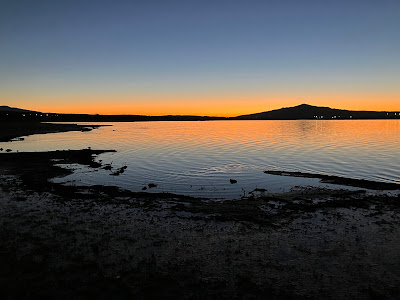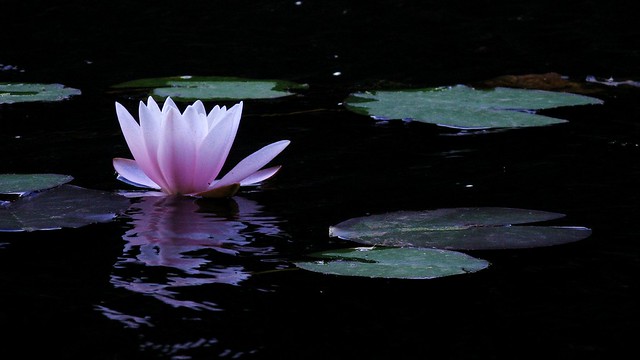Qué mejor manera de empezar el primer día de año que convirtiendo en texto la oscuras intuiciones que el sueño y la pesadilla han vertido en mis arenas en una noche más padeciendo otro episodio COVID cual Sísifo penitente.
Así estamos, con cierto empacho digestivo y respiratorio, pero no les aburriré, vayamos al asunto. Hace unos años hice pública una teoría de la mano de mi amigo Nicolás Fabelo: La muerte como asíntota. Como somos de andar por casa en lugar de publicarla en una revista filosófica o científica lo hicimos en el Huffington post, nos perdonarán. En ella contemplamos el proceso de morir haciendo un símil donde la consciencia sería luz que se acerca al horizonte de sucesos. Esta hipersuperficie delimita dos tipos de espacio tiempo, el del universo conocido y el de la otra parte que aún no conocemos. La teoría nos dice que no hay tiempo allá, es decir que al otro lado todo existe sin esa dimensión. Aunque sí parece existir temperatura, una décimas de grado Kelvin, lo que quizá no dé alguna pista de la posibilidad de un pequeñísimo margen de tiempo que permita algún movimiento, pero no nos engañemos, lo que digamos del otro lado son tan solo hipótesis.
Bueno volvamos a nuestra hipótesis, el sujeto al morir se acercaría a su propio horizonte de sucesos y al estar muy cerca su tiempo se curvaría como lo hace la luz al acercarse al agujero negro, eso permitiría que toda la vida pasara ante los ojos, antes de que la luz se apague del todo y el tiempo desaparezca.
Ahí lo dejábamos. Lo que ha pasado esta noche es que mi sueño se ha llenado de aborígenes australianos, tribus perdidas africanas, chamanes del norte y todo tipo de viajeros de tiempo. Incluso si miro bien había algún griego, en Delfos tenían un centro pionero. Aunque les parezca increíble viajar en el tiempo ha sido fundamental para la supervivencia del ser humano. Y al igual que aprendimos el difícil arte de viajar por las tres dimensiones del espacio lo hicimos con la dimensión temporal. Elon Musk es un advenedizo comparado con los valientes polinesios que se enfrentaron al Pacífico, los griegos que salieron en barco del mediterráneo o los vikingos que llegaron a Terranova, entre otros muchos valientes. Pero ¿por qué era tan importante viajar? Sencillamente por que cuando vienen mal dadas no hay más opción. Si estamos hoy sufriendo los excesos navideños es gracias a todos aquellos que se lanzaron a viajes imposibles. También en el tiempo. Con frecuencia era necesario acercarse al mundo de los dioses y espíritus que es como durante mucho tiempo se ha llamado al horizonte de sucesos de la metafísica. El experto inducía un trance, modificaba su conciencia o la de otra persona y se acercaba a esa frontera para buscar respuestas. Se utilizó música, ritmo, danza, drogas y se indujeron sueños. Tenían claro que no se podía uno meter ahí con la consciencia habitual, “nadie puede mirar a dios y seguir vivo”.
Por eso hoy les traigo otro bucle extraño de consciencia y tiempo, el que forma el místico aportando su atención contemplativa por un lado y el que forma el lado metafísico aportando presencia por el otro.
Imaginen a su sabio o místico favorito en actitud meditativa. Su intención es contemplar la luz divina, ser iluminado. Para ello habitualmente aquietará su cuerpo y concentrará su atención el algo que le ayude a abrirse a lo infinito. No hace falta ser un genio es esto, a ustedes quizá les habrá pasado que dando un paseo por algún paraje natural empiezan a experimentar un alivio en el peso de sus preocupaciones y una apertura ante algo que les supera en belleza, armonía, espacio y tiempo.
Es esta la paradoja de los dos tiempos, el humano, flexible, corriente y unido a la vida y al dolor, y el llamémosle divino, inflexible, inmutable y separado de lo vivo y lo sufriente. El ser humano para ser pleno requiere un poco del otro tiempo, la “presencia de Dios”, y probablemente lo metafísico también requiera la atención contemplativa del humano para dar plenitud a su existencia. Aquí ya me estoy arriesgado demasiado, la teología defiende que un Dios pluripotencial no necesita absolutamente nada del ser humano ni de criatura alguna, por eso tan solo apunto que aunque no lo necesite igual no le viene mal del todo: ¿Qué sería de un dios que no pudiera ser contemplado, descubierto, amado?. Y ya tendrían el Inn y el Yang formado, en un bucle infinito que nos abre oportunidades de encontrar sentido y respuestas que de otra forma serían imposibles.
Bueno amigos ahí les dejo. Espero que puedan disfrutar de una feliz jornada en la que quizá quepa alguna sonrisa.
It's a question of time.
What better way to start the first day of the year than turning into text the dark intuitions that dream and nightmare have poured into my sands on yet another night suffering another COVID episode like a penitent Sisyphus.
So here we are, with a certain digestive and respiratory cramp, but I won't bore you, let's get down to business. A few years ago I published a theory by the hand of my friend Nicolás Fabelo: Death as an asymptote. As we're a homebody, instead of publishing it in a philosophical or scientific journal, we did it in the Huffington post, so you'll forgive us. In it we contemplate the process of dying by making a simile where consciousness would be light approaching the event horizon. This hypersurface delimits two types of spacetime, that of the known universe and that of the other part that we do not yet know. The theory tells us that there is no time there, i.e. everything on the other side exists without that dimension. Although there does seem to be temperature, a tenth of a degree Kelvin, which may not give any clue to the possibility of a tiny margin of time that allows some movement, but let's not fool ourselves, what we say on the other side are only hypotheses.
Well let's go back to our hypothesis, the subject at death would approach its own event horizon and being very close its time would bend as light does when approaching the black hole, that would allow all life to pass before the eyes, before the light is completely extinguished and time disappears.
That's where we left off. What happened tonight is that my dream was filled with Australian aborigines, lost African tribes, northern shamans and all sorts of time travellers. Even if I look closely there were some Greeks, at Delphi they had a pioneering centre. Incredible as it may seem to you, time travel has been fundamental to human survival. And just as we learned the difficult art of travelling through the three dimensions of space, we did the same with the time dimension. Elon Musk is an upstart compared to the brave Polynesians who braved the Pacific, the Greeks who sailed out of the Mediterranean or the Vikings who reached Newfoundland, among many other brave people. But why was it so important to travel? Simply because when the going gets tough there is no other option. If we are suffering the excesses of Christmas today, it is thanks to all those who embarked on impossible journeys. Also in time. It was often necessary to approach the world of gods and spirits, which is what the event horizon of metaphysics has long been called. The expert induced a trance, modified his or someone else's consciousness and approached that boundary to seek answers. Music, rhythm, dance, drugs and induced dreams were used. It was clear to them that you couldn't go in there with your usual consciousness, "no one can look at god and still be alive".
So today I bring you another strange loop of consciousness and time, the one formed by the mystic bringing his contemplative attention on the one hand and the one formed by the metaphysical side bringing presence on the other.
Imagine your favourite sage or mystic in a meditative attitude. His intention is to contemplate the divine light, to be enlightened. To do this he will usually still his body and concentrate his attention on something that will help him to open up to the infinite. You don't need to be a genius to do this, it may have happened to you that while taking a walk in a natural setting you begin to experience a relief from the weight of your worries and an openness to something that surpasses you in beauty, harmony, space and time.
This is the paradox of the two times, the human, flexible, current and united to life and pain, and the so-called divine, inflexible, immutable and separated from the living and the suffering. The human being requires a little of the other time, the "presence of God", in order to be full, and probably the metaphysical also requires the contemplative attention of the human to give fullness to its existence. Here I am already taking too much of a risk, theology defends that a pluripotential God needs absolutely nothing from human beings or from any creature, so I only point out that even if he doesn't need it, it doesn't hurt him at all: What would become of a God who could not be contemplated, discovered, loved? And they would already have the Inn and the Yang formed, in an infinite loop that opens opportunities for us to find meaning and answers that would otherwise be impossible.
Well friends, that's where I leave you. I hope you can enjoy a happy day in which perhaps there is room for a smile.
这是一个时间问题。
机器翻译,原谅错误。
新年伊始的第一天,还有什么比把梦境和噩梦中的黑暗直觉变成文字更好的呢?
现在,我的消化系统和呼吸系统都有些痉挛,但我不会让你感到无聊,让我们言归正传吧。几年前,我的朋友尼古拉斯-法贝罗(Nicolás Fabelo)发表了一个理论:死亡是一种渐近线。因为我们都是宅男,所以没有在哲学或科学杂志上发表,而是在《赫芬顿邮报》上发表了,请大家见谅。在这篇文章中,我们通过一个比喻来思考死亡的过程,在这个比喻中,意识就像是接近事件视界的光。这个超曲面划定了两种时空,一种是已知宇宙的时空,另一种是我们尚未知晓的宇宙时空。该理论告诉我们,那里没有时间,也就是说,另一边的一切都不存在时间维度。虽然那里似乎有温度,十分之一开尔文的温度,这可能不会给我们提供任何线索,让我们知道有可能存在微小的时间余量,允许一些运动,但我们不要自欺欺人了,我们所说的另一边只是假设。
好吧,让我们回到我们的假设,实验对象在死亡时会接近它自己的事件视界,由于非常接近,它的时间会弯曲,就像光在接近黑洞时一样,这将允许所有生命在光完全熄灭和时间消失之前在眼前流逝。
这就是我们离开的地方。今晚发生的事情是,我的梦里充满了澳大利亚原住民、失落的非洲部落、北方巫师和各种各样的时间旅行者。即使我仔细观察,也能发现一些希腊人,他们在德尔斐有一个开拓中心。你可能会觉得不可思议,但时间旅行是人类生存的根本。就像我们学会了在三维空间中旅行的高难度艺术一样,我们在时间维度上也做到了这一点。与勇闯太平洋的勇敢的波利尼西亚人、驶出地中海的希腊人、到达纽芬兰的维京人以及其他许多勇敢的人相比,埃隆-马斯克不过是个后起之秀。但为什么旅行如此重要?很简单,因为当困难来临时,我们别无选择。如果说今天的圣诞节让我们过足了瘾,那么这要归功于那些踏上不可能完成的旅程的人们。在时间上也是如此。人们常常需要接近神灵的世界,这也是形而上学长期以来所称的 "事件视界"。专家会诱发恍惚,改变自己或他人的意识,并接近那个界限以寻求答案。他们使用音乐、节奏、舞蹈、药物和诱导梦境。他们很清楚,你不可能带着平常的意识进入那里,"没有人可以看着上帝还活着"。
因此,今天我给大家带来了另一种奇特的意识和时间循环,一方面是神秘主义者带来的沉思注意力,另一方面是形而上学者带来的存在感。
想象一下你喜爱的圣人或神秘主义者的冥想姿态。他的目的是思考神圣之光,获得启迪。为此,他通常会静止身体,将注意力集中在有助于他向无限敞开的事物上。你不需要是个天才就能做到这一点,也许你曾有过这样的经历,当你在自然环境中散步时,你开始体验到一种从烦恼中解脱出来的感觉,一种向超越你的美丽、和谐、空间和时间的事物敞开的感觉。
这就是两个时代的悖论,一个是人类,灵活、流动,与生命和痛苦融为一体;另一个是所谓的神圣,缺乏灵活性,一成不变,与生命和痛苦相分离。人需要一点另一个时间,即 "神的存在",才能充实,而形而上学可能也需要人的沉思关注,才能使其存在充实。在这里,我已经冒了太大的风险,神学辩护说,多能的上帝绝对不需要人类或任何生物的任何东西,所以我只想指出,即使他不需要,这对他也没有任何伤害:一个不能被思考、发现和爱的上帝会变成什么样呢?他们已经有了 "客栈 "和 "阳间",在一个无限的循环中,为我们提供了找到意义和答案的机会,而这在其他情况下是不可能的。
好了,朋友们,我就说到这里。我希望你们能度过一个快乐的一天,在这一天里,也许还有微笑的空间。









